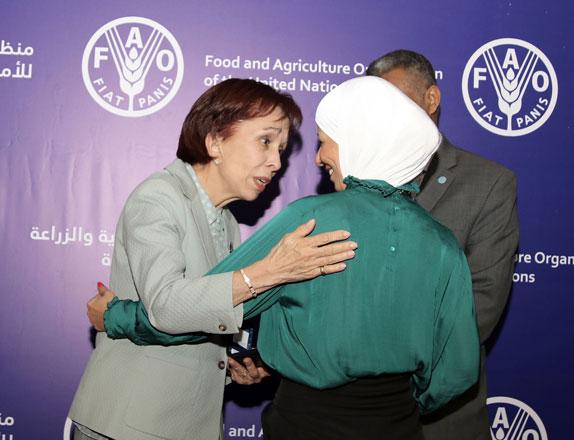You are here
Jordan’s dependence on imports threatens its food security — experts
By Ana V. Ibáñez Prieto - Nov 04,2018 - Last updated at Nov 04,2018
AMMAN — “Can we feed the world with a few drops of water?” is the question that experts in food security addressed on Saturday, during a panel discussion held by the World Food Programme (WFP) and the Food and Agriculture Organisation (FAO), where stakeholders agreed that Jordan is in "dire need" of strengthening its internal agriculture production to secure food availability.
“Jordan is currently not suffering from shortages in food availability, but the Kingdom has been historically exposed to major shocks due to its dependence on imports and the unstable conditions of the region,” FAO Representative in Jordan Nasredin Hag Elamin stated, stressing the need to improve the Jordanian agriculture sector to prevent inflection points in food security in the event of an unexpected lack of imports.
However, achieving that goal would require stakeholders to come together to address the fact that only 7.5 per cent of the land in Jordan is valid for the production of food due to severe water scarcity, according to the director of the Water Ministry’s Water Demand Management Department, Awni Kloub.
The session on food security came as part of a series of seminars held under the framework of the Sustainable Development Goals (SDGs) in commemoration of the 73rd United Nations Day, which saw the attendance of over 250 youth from across the Kingdom.
The discussion focused on the ways to achieve SDG 2, which calls on nations to “end all forms of hunger and malnutrition by 2030, making sure all people — especially children — have access to sufficient and nutritious food all year round”.
Partnerships officer at FAO and moderator of the discussion, Sally Berman, pointed out that “800 million people across the world are currently suffering from hunger due to conflict, climate change or economical challenges, while in Jordan, 6.6 per cent of the population is still suffering from food insecurity”.
According to the latest report issued by FAO in cooperation with International Fund for Agricultural Development, 1 million people in Jordan continue to suffer from malnourishment, Elamin noted, warning that “while it is technically achievable to eradicate this, we still have many challenges to face”.
“First and foremost, we must face the reality that, even when there is no problem in terms of the amount of food resources available, access can be null for certain pockets and community segments in marginalised areas,” the official continued, calling on stakeholders to develop plans to ensure a stable income and purchasing power for the entire population.
"Even if we manage to fully eradicate hunger and malnourishment, we could end up going back to the starting point due to an unexpected shock combined with Jordan’s dependence on imports,” Elamin warned.
“This takes us directly to target 2.4 of SDG 2,” he continued, referring to the agenda’s call to “ensure sustainable food production systems and implement resilient agricultural practices that increase productivity and production, that help maintain ecosystems, that strengthen capacity for adaptation to climate change, extreme weather, drought, flooding and other disasters and that progressively improve land and soil quality”.
Highlighting Jordan's current position as second most water scarce country in the world, Kloub stressed that “the real question we need to solve is how much water do we need to increase food production and how are we going to obtain it”.
“Our agriculture production depends on a rainfall and we are now focusing on building water dams,” the official continued, noting that 11 water dams have been established so far in Jordan.
Programme officer at WFP, Mohammad Ismail, stressed the need to address the lack of data in malnourishment in the Kingdom, warning that the last comprehensive study in malnutrition in Jordan dates back to 2010.
“Without real figures, we can’t possibly build a programme that tackles the structural factors causing hunger and malnourishment,” the officer said, calling on stakeholders to develop modern studies that set a clear path to fully eradicate hunger in the Kingdom.
Related Articles
AMMAN — Jordan imports food products worth $3.8 billion annually, in addition to wheat products not included in this amount, a senior offici
Although Jordan achieved the Millennium Development Goal on reducing hunger in 2013, the impact of the Syrian crisis at regional and national levels is endangering this achievement, UN officials said.
AMMAN — Jordan on Thursday joined the international community in marking World Food Day, which is celebrated annually in honour of the UN Fo

















